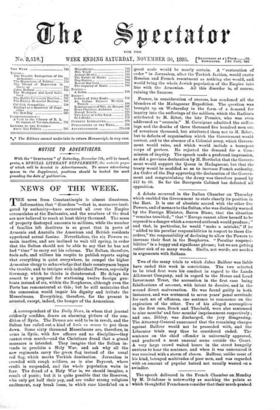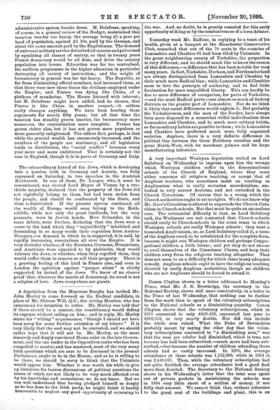The speech delivered in the French Chamber on Monday by
M. Delafosse is noteworthy as marking the points at which thoughtful Frenchmen consider that their much-praised
administrative system breaks down. M. Delafosse, speaking, of course, in a general review of the Budget, maintained that taxation was far too heavy, the average being £5 a year per head of population, against 22 10s. paid by the German, and about the same amount paid by the Englishman. The demand of universal military service disturbed all careers and pulverised by equalising all classes of society, so that in twenty years French democracy would be all dust, and drive the country population into towns. Education was far too centralised, the uniform programme in the higher education in particular destroying all variety of instruction; and the weight of bureaucracy in general was far too heavy. The Republic, so far from diminishing official numbers, had increased them, so that there were now three times the civilians employed under the Empire; and France was dying like China, of a plethora of mandarins. The House listened with interest; but M. Delafosse might have added, had he chosen, that France is like China in another respect,—it seldom really changes anything. We have been hearing these arguments for nearly fifty years; but all that time the taxation has steadily grown heavier, the bureaucracy more numerous, the centralisation more complete. France has grown richer also, but it has not grown more populous or more generally enlightened. The oddest fact, perhaps, is that while the general wealth has enormously increased, and the numbers of the people are stationary, and all legislation tends to distribution, the "social conflict" becomes every year more and more embittered. That is certainly not the case in England, though it is in parts of Germany and Italy.











































 Previous page
Previous page